Game of Thrones: Why does it inspire such devotion among fans?
- Published
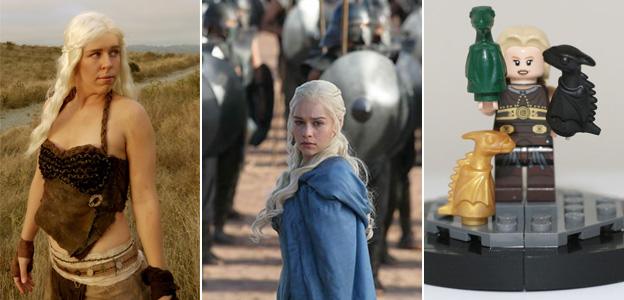
Emilia Clarke as Daenerys (centre), with fan Roxanna Meta in character and a Lego Daenerys
The third series of American TV show Game of Thrones is hotly anticipated. But the behaviour of fans is almost as intriguing as the action on screen.
A lot of British people may still not have heard of it, but Game of Thrones has quite a cult following.
The lumbering giant of a show - which sees seven families competing for an iron throne in a world of wolves and dragons, sword fights and Shakespearian feuds - is in some ways an unconventional hit.
It has hundreds of characters and a sprawling back story. Its heroes are an illegitimate son, a dwarf and a tomboy.
Most of the cast is British - many speak with regional accents - and it is filmed mainly in Northern Ireland.
Yet it has been a huge hit in the US. About four million Americans tuned in for the last series' opening on US network HBO but even more downloaded at least one episode last year, making it the most pirated TV show of 2012.
The third series, which starts on 31 March in the US, and 1 April in the UK, is eagerly awaited on both sides of the Atlantic.
But the size of the audience - legal or otherwise - does not tell the full story.
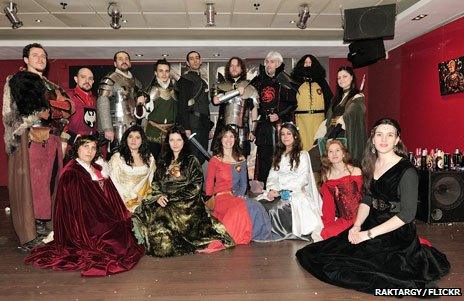
Game of Thrones fans at a Spanish convention
The passion and the extreme devotion of fans has created a phenomenon unlike anything attached to rivals such as 1960s advertising drama Mad Men, or even the hugely popular Sopranos and Lost, which both attracted more than 10 million viewers.
The activism of fans is apparent on craft sites like Etsy and Folksy. Someone has collated the 10 weirdest "Game Of Thrones" objects, external, including a direwolf handpuppet and a Dothraki onesie, and elsewhere replica dragon eggs are on sale.
"My name is Bryony, and I am addicted to Game of Thrones," wrote the Daily Telegraph's Bryony Gordon in a column last year, external.
"The other day I downloaded a map of Westeros to my iPad. I have taken to calling my boyfriend my 'sun and stars'. Recently, I entered a competition to win a crown worn by Robert Baratheon (runner-up prize, the one worn by King Joffrey)."
Game of Thrones events are a regular fixture at comic conventions around the world.
Mark Zuckerberg reportedly held a Game of Thrones-themed barbecue serving goat and "obscure animal parts" last year.
And there is a small but growing number of people travelling to the outdoor locations where the series - which is adapted from the books of American author George RR Martin - is filmed.
Game of Thrones fan Alex Chen, a business school graduate in New York City, recreates scenes from the show on his website via the medium of Lego, external.
"I wanted to go through the entire series - the most striking scenes, the different characters and the world it creates," he says.
It's not an ironic undertaking but an attempt to convey the story's power.
"I definitely think it's expressive. I'm trying to get the same feeling that you get through watching the show or reading the books."
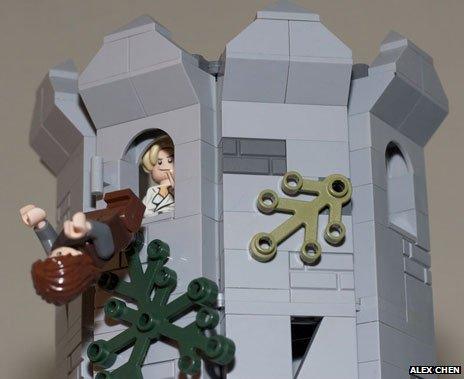
The attempted murder of Bran Stark by Jaime Lannister - in Lego
Some go as far as choosing names from the show. The New Yorker related how, external a couple at one of Martin's book signing asked the writer to pose for a photograph with their daughter Daenerys, named after the dragon maiden Daenerys Targaryen.
For others, it becomes a commercial enterprise, although not necessarily to make money.
Ashley, a tattoo artist in Cleveland, sells scarves in the shape of the direwolf, symbol and protector of the House of Stark. It's a labour of love, taking her a week to make each one for a sale of $90 (£60).
"It's a nerdier, geekier thing to do, like going to a Comic Con [comic convention]. People love them and that makes me happy," she says.
The strong female characters and dramatic costumes are a pull for Toronto-based burlesque dancer Scarlett LaFlamme.
"I won't give away what Daenerys does to one of her dragons in my act, but it definitely will never happen in the TV show," she says.
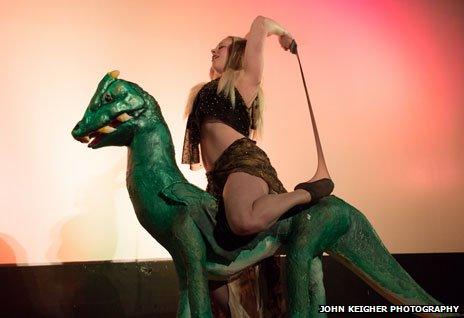
Scarlet LaFlamme's "Game of Thrones" burlesque routine
The news that HBO was to sell a replica iron throne for $30,000 (£19,764) prompted Brent Sheen, an elementary school teacher in Calgary, Canada, to come up with his own low budget alternative.
He makes a decal, or transfer, that will turn a toilet into a throne, selling 300 since last summer.
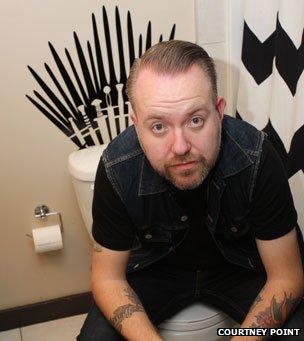
On the iron throne: Brent Sheen with his toilet decal
"It's geek culture, man! The things I have most success with are the ones that make someone feel part of the show," he says.
At Belfast's comics convention, Titan Con, fans dressed up in costume, there were talks about the show, and a coach tour visiting key locations.
There are no statistics on tourist numbers. But anecdotally they are coming under their own steam to locations such as the Giant's Causeway in Northern Ireland and the volcanic landscape around Lake Myvatn in northern Iceland.
"The people who come here at the moment are super fans who research everything themselves," says Gudrun Birna of Promote Iceland.
There have always been epics - Star Wars perhaps being the most famous - that create a mass fan movement. But why certain shows resonate more than others is not an exact science.
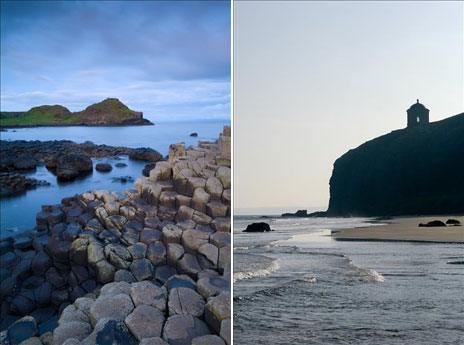
Northern Irish locations for Game of Thrones
Chelsea Monroe-Cassel, who co-authored a cookbook based on the show, thinks it's the rich detail that creates the fan's devotion.
"In the descriptions of heraldry, castles, clothes and jewellery, and certainly the food, he [Martin] draws us closer to that world," she says.
For many critics, Martin has updated Tolkien with a more morally ambiguous world drawn from the best bits of history - the Wars of the Roses, Ancient Greece, the Crusades.
And then there's the sex. The term "sexposition" - where onscreen nudity is used to distract viewers during the wordier scenes - was coined by a TV critic, external specifically about Game of Thrones. An actress walked off set in the second season, external in protest at what she said was gratuitous nudity.
Most fantasy is "inherently uncool", says Harriet Walker, a fashion journalist who admits to being obsessed with the show. But Game of Thrones bucks the fantasy cliche, she argues.
"It's so slick and well done, in a way that I find much cooler and less hempen than something like Lord of the Rings."
The show's look owes much to high fashion, she believes. Court outfits worn by Sansa and Cersei echo Alexander McQueen, while Jon Snow and the Night Watch look as if they're dressed in Rick Owens - famous for putting Kate Moss in a distressed leather jacket.
But in the end its appeal comes back to scale - summers that last for years, epic battles between bitter rivals, and the vast wilderness of the icy north.
"The main reason I love it so much is because it is just so massive," she says.
"And very few things are massive anymore - they're all cheap, instant or transient."
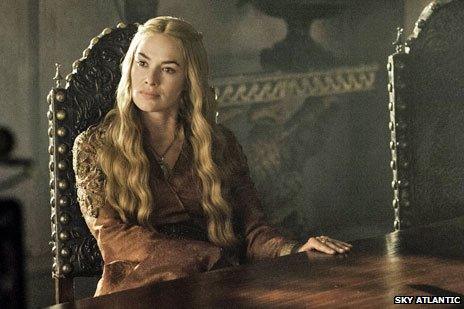
Lena Headey as Cersei: Fantasy fashion icon?
You can follow the Magazine on Twitter, external and on Facebook, external